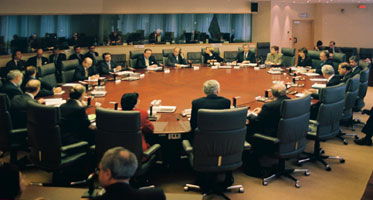Its main job is to draft new laws.
Its other jobs are to: ![]() Ensure member states apply the laws
Ensure member states apply the laws![]() Apply the laws on fishing
Apply the laws on fishing![]() Watch over competition in business
Watch over competition in business
|
What it does The European Commission is the group of people who come up with ideas for new laws. It gets its ideas from lots of people: |
 |
![]() From people who work at the Commission,
From people who work at the Commission, ![]() From governments of countries that are members of the European Union,
From governments of countries that are members of the European Union, ![]() From pressure groups that want to help, for example, business, the consumer, or the environment.
From pressure groups that want to help, for example, business, the consumer, or the environment.
When laws get made it is the job of the Commission to make sure the member countries put the laws into practice.
If a country fails to obey the laws, the Commission may take the country to the European Court of Justice.
The Commission does two other things.
First, it looks after the fishing industry across Europe and sets limits on how much and what kinds of fish can be caught so stocks don't run out.
Secondly, it looks after competition in business and makes sure companies have an equal chance to compete with each other.
Who runs it
The people who run the Commission are called Commissioners.
There are 28 of them, one from each member state.
Each Commissioner has a special job, such as agriculture, transport, the environment, trade, foreign affairs.
The top Commissioner is the President of the Commission. The new President from January 2015 is Jean-Claude Juncker, former Prime Minister of Luxembourg.
The Commissioners, including the President, are appointed by the Parliament on the recommendation of member states. They do the job for five years, the current period expiring in late 2014.
They are accountable to the Parliament that can fire them in the case of incompetence or misbehaviour.
The Commissioner from the UK is Jonathan Hill, Lord Hill. He looks after financial stability, financial services and capital markets union.
Besides the Commissioners there are about 25,000 people, called officials, who work at the Commission.
25,000 may sound like a lot of people but it’s about a quarter of the number of people who work in a single large government department in the UK.
These officials come from the member states in numbers that are more or less in proportion to the size of the country.
But from the UK recruitment is low. The UK has about 12 per cent of the population of the EU, but only five per cent of EU staff including officials who work at the Commission.
The Commission works day to day in English, French and German.
Chart
You can look at a chart showing how proposals for new laws have to be considered by all three main institutions. As they go through the system they can be amended, approved or thrown out. All three institutions must agree.
Click for the chart and then come back to this page
Back to The Main Institutions

